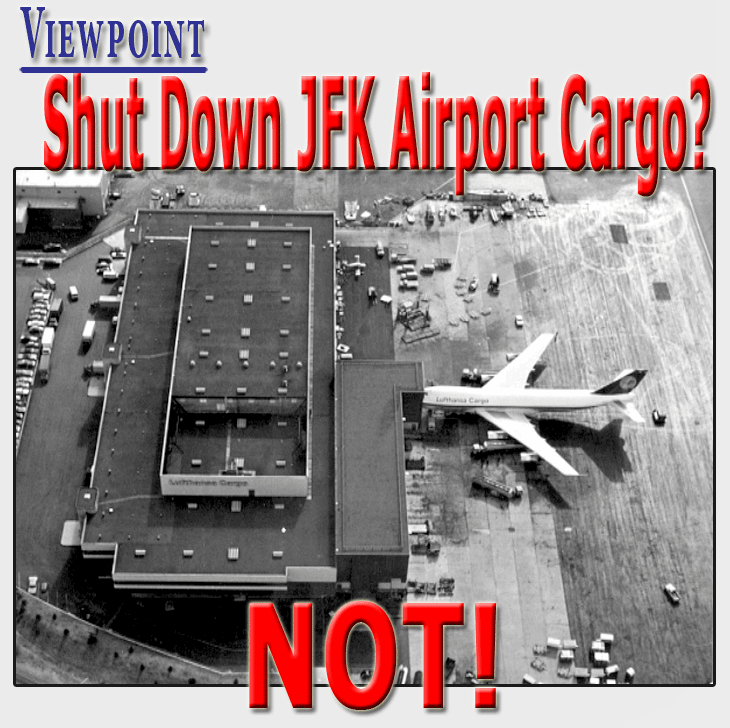
Will JFK International Airport, New York—the airport that pioneered
the 747 freighter in 1972, when LH connected FRA with an automated plug-in
building at the airport—shut down cargo in favor of the perennially
underused Stewart Airport, located 45 miles north of New York? Not such
a great idea, says Brandon Fried, executive director, AirForwarders Association.
Sometimes it is easy, maybe too easy, for
policy makers to simply regard airports as passenger hubs, while ignoring
their utility and value as important gateways for air freight. Unfortunately,
we fear this may have happened in New York, as Governor Andrew Cuomo’s
administration begins its work on a much-needed revitalization of LaGuardia
and JFK airports.
Unveiled in the midst of a re-election campaign,
it is perhaps understandable that the focus of this plan would be on easing
access and boosting convenience for the millions of passengers who use
those airports, as well as on the economic value to the city and the region
of the tourists who come in from around the world. After all, cargo doesn’t
vote.
However, it was disconcerting to hear reports
in the press that the plan would simply “shift” cargo operations
from JFK to Stewart Airport, 85 miles away in the Hudson Valley, presumably
to somehow ease passenger operations at JFK. Knowing the realities of
how air cargo is transported and handled, how could this ever work?
The short answer is: it can’t work
and it won’t work.
Let’s start with the practical realities.
JFK is the world’s largest cargo gateway in terms of the value of
the freight handled there. With the airport processing 1.4 billion tons
of freight annually, air cargo operations at JFK are a major employer
in Queens, associated with 50,000 jobs and paying more than $3 billion
in wages.
Now, add to that the fact that half the
cargo going in and out of JFK is being carried in the bellies of passenger
planes, while much of the freighter traffic is directed into JFK to access
the forwarding operations that are set up around that airport –
some 600 forwarder businesses in all. There is no way on God’s green
Earth that international passenger flights are going to be diverted in
great numbers to Stewart, and the airlines are not going to stand for
flying empty cargo holds into JFK, so how otherwise are cargo operations
going to be “shifted?” The only answer we can come up with
is to systematically truck all cargo that comes into JFK to Stewart or
some other outlying facility, require forwarders to process cargo in those
places, thereby greatly diminish the speed and efficiency that is at the
center of the airlines’ and air forwarders’ value proposition.
That’s what we would call a non-starter.
In addition to reducing the New York gateway’s value as a cargo
hub and giving airlines a reason to do some shifting of their own with
regard to their U.S. gateways, it would wipe out the close to 600 forwarder
businesses operating in the vicinity of the airport. Shippers and airlines
will seek refuge by relocating operations to Philadelphia, Newark, Baltimore,
Boston or Washington rather than facing the delays of routing cargo 85
miles to another facility. The newer generation planes with generous cargo
capacity are already flying to these cities where increasing populations
would provide new international gateway opportunities for carriers seeking
a JFK alternative. Remember, Newark and Philadelphia have established
airline hubs and could be considered viable JFK alternatives in the short
term.
So what shall we do to ensure that air cargo
remains a critical element of the city’s airports and will continue
to be a linchpin to their success and to the health of the local economy?
We think involving the forwarders in airport
revitalization would be a good start.
We do believe that the governor's heart
is in the right place, and we recognize that there are cargo-related issues
at JFK that need to be addressed in any modernization effort in order
to maximize efficiency and convenience for all who use the city’s
airports, cargo operations included. As one example, we all know that
road access to and from the JFK continues to be an issue for airlines,
passenger, forwarders and shippers. But we think these things can be worked
out, and I am convinced that our forwarder community can offer some excellent
ideas for how to move forward and, importantly, can help rally wider industry
and public support that will be important to getting the plan off the
drawing board and through implementation.
I am optimistic we can do it. And I look
forward to that ribbon-cutting one day in the not-too-distant future where
a gleaming new JFK is unveiled, and the freight forwarders are there to
cheer it on.
Brandon Fried
Editor's Note: Brandon Fried is executive director of the
Airforwarders Association. |





